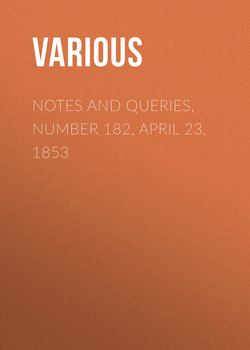Читать книгу Notes and Queries, Number 182, April 23, 1853 - Various - Страница 2
Notes
ON A PASSAGE IN OROSIUS
ОглавлениеIn King Alfred's version of Orosius, book ii. chap. iv. p. 68., Barrington, we have an account of an unsuccessful attempt made by one of Cyrus the Great's officers to swim across a river "mid twam tyncenum," with two tynkens. What was a tyncen? That was the question nearly a hundred years ago, when Barrington was working out his translation; and the only answer to be found then was contained in the great dictionary published by Lye and Manning, but is not found now in Dr. Bosworth's second edition of his Dictionary: "Tynce, a tench."
How the Persian nobleman was to be supported by two little fishes, which were more likely to land their passenger at the bottom of the river than on the opposite bank, we are left to guess. But, before we proceed with the experiment, let us see that we have got the fishes. That tench was in the Gyndis we have no authority for denying; but, if its Anglian or Saxon name was such as the dictionary exhibits, we have no trace of it in the text of Alfred; for under no form of declension, acknowledged in grammar, will tynce ever give tyncenum. We have no need, then, to spend time in calculating the chance of success, when we have not the means of making the experiment.
As either tync or tynce would give tyncum, not tyncenum, the latter must come out of tyncen (query, tynkin or tunkin, a little tun, a barrel, or a cask?). Such was the form in which the question presented itself to my mind, upon my first examination of the passage three or four years ago, but which was given up without sufficient investigation, owing to an impression that if such had been the meaning, it was so simple and obvious that nobody could have missed it.
An emergency, which I need not explain here, has within these few days recalled my attention to the subject; and I have no reason to be ashamed, or to make a secret, of the result.
Tyncen, the diminutive of tunne, is not only a genuine Anglo-Saxon word, but the type of a class, of whose existence in that language no Saxonist, I may say no Teutonist, not even the perspicacious and indefatigable Jacob Grimm himself, seems to be aware. The word is exactly analogous to Ger. tönnchen, from tonne, and proves three things:—1. That our ancestors formed diminutives in cen, as well as their neighbours in ken, kin, chen; 2. That the radical vowel was modified: for y is the umlaut of u; 3. That these properties of the dialect were known to Alfred the Great when he added this curious statement to the narrative of Orosius.
E. Thomson.
